- Home
- Gaelen Foley
The Duke Page 3
The Duke Read online
Page 3
“Oh, Papa. It’s just—I don’t know how I’m ever going to get you out of here. It’s such a lot of money. You are my father and I would never reproach you, but sometimes I just wish . . . that you had sold the manuscripts instead of donating them to the Bodleian Library.”
A rare, stern look of disapproval knit his bushy white eyebrows. “Sell them? Daughter, for shame! Think on your words. These are priceless works of art that I salvaged from the hands of unscrupulous dealers. Can you sell beauty? Can you sell truth? These books belong to all humanity.”
“But to buy them, you spent the money that was earmarked for our rent and our carriage and our food, Papa.”
“And I am the one who shall suffer for my principles, am I not? I consider myself in fine company in that regard— Saint Paul, Galileo. Well, you have everything you need, don’t you? The school gives you room and board and other girls to talk to.”
“Well, yes, but—”
“Then fret not over my welfare. In this life, we make our choices and we pay the price. I’m not afraid of whatever my fate holds.”
“Yes, Papa,” she murmured, lowering her head. She stewed at his deluded lecture but didn’t dream of telling him that he was comfortable in his enchanter’s study only because of her constant toil and sacrifices. Instead she brought their visit to a close. He no doubt was eager to get back to his work on the moldering text. She kissed him dutifully on the cheek and promised to return tomorrow. He patted her on the head fondly, then the jailer let her out.
She steeled herself as she followed the guard back down the stairwell. It was time to face the warden of the Fleet. The door at the back of the long lobby was open. She saw the prisoners shuffling inside from the courtyard, returning to their cells. It had begun to rain again. Bel heaved a disgusted sigh to think of her holey boots and the long walk home.
She tapped the guard on the shoulder. “May I speak to the warden privately for a moment, please?”
“Oh, sure, missy. He’ll be ‘appy to meet you—privately,” the guard said with a knowing leer.
Bel scowled at him, but a moment later, she was shown into the office. The big, hulking warden rose at her entrance but did not smile. The guard closed the door as he left.
“Thank you for seeing me,” she said nervously. “I am Miss Hamilton. My father, Mr. Alfred Hamilton, is in cell one-twelve-B. Do you mind if I sit?”
He sliced her a military nod. She eased warily into the chair across from his desk. She glanced around the small, cramped, gloomy office. There were racks of rifles fixed to the wall, a locked ammunition box, and a coiled bullwhip on a nail.
“What seems to be the problem?” he asked, brusque and impatient, his rough voice tinged with an Australian twang. Lord, but he made her nervous.
“Well, sir, you see, ah, the thing is—this month I’m afraid I have somehow come up short in regards to my father’s chamber fees. I—I’m very sorry and I promise it will never happen again, but if you could just see clear to give me an extra fortnight just this once, then I could pay in full. . . .”
She faltered as his leathery face hardened. His skeptical stare seemed as though he half suspected she had spent the money on gin or something equally disreputable.
“This ain’t no moneylender’s, miss.”
“I realize that, but... surely something can be done.” She attempted to smile winningly at him. “I already work several jobs, but some young friends of mine needed shoes for the winter. . . .” Her voice trailed off. His expression told her clearly he didn’t want to hear her excuses. “I’m in quite desperate straits, sir. That is all.”
“Haven’t ye menfolk to help ye? No brothers? Uncles? No husband?”
“No, sir, there’s only me.”
His gaze slid downward. “Well, let’s ‘ave a look.” His keys jangled as he sat down at his desk and flipped through his ledger, then fingered a column. “Appears we’ve never ’ad delays on your account before.”
“I have certainly done my best,” she agreed, feeling a faint spark of hope.
“Mm-hmm.” He sent her a glance with a gleam in his cold, glassy eyes that made her shrink back from him slightly. “Well, now.” He stroked his scar. “Under the circumstances, I’m sure we can arrive at some satisfact’ry arrangement. Let me think on it. Jones!” he bellowed abruptly, summoning his assistant. “Call me carriage around for the young lass.”
“Sir?” she asked, wide-eyed.
He looked at her after his assistant had disappeared. “You arrive here every day on foot, Miss Hamilton, so I’ve noticed. It’s pourin‘ rain. My man will drive you home.”
“Thank you, sir, that’s very kind, but it’s not necessary—”
“Yes, it is. G’day.” Having summarily dismissed her, the warden of the Fleet went back to work.
“Good day,” she replied uncertainly, rising. With a frown of gnawing uneasiness, she went back out to the front of the prison. She did not want to accept a ride from the man. It was far from proper. On the other hand, she didn’t want to offend him, either, since he held Papa’s fate in his hands. She bit her lip in indecision as she stood under the arched entrance while the rain fell, cold and dismal. She was essentially a practical woman. What if she got sick from walking home in this weather? She couldn’t afford to miss a day’s work. It wasn’t as though the man would be in the carriage with her.
A battered ex-hackney coach pulled up, drawn by a sway-backed nag. A driver in a soggy top hat beckoned her over. Hesitating only a moment longer, Bel dashed over the pavement and let herself up into the cab.
All innocence, she told the warden’s driver where she lived.
* * *
The duke of Hawkscliffe, when in Town, lived in a sumptuous urban palace with a view of Green Park. Behind a brick wall topped with wrought-iron spikes, Knight House stood in all its Palladian grandeur, aloof and impregnable, gleaming, cold and pearly in the black wet April night.
Long shadows from the lampposts sculpted the stark, elegant symmetry of its flawless facade, while great Newfoundland dogs and thick-bodied mastiffs padded the neatly groomed grounds, alert for intruders, but all around the vast mansion was silent. Through the front door, into the chandeliered opulence of the grand entrance and down the marbled corridors, a hollow stillness pervaded everywhere. The servants, brisk and hushed, cleared the dining room where the master had dined, as usual, alone.
Now he sat inert at the magnificent pianoforte in a corner of the dim library. He owned several of the instruments, being a bit of a collector and a musical connoisseur. He had a Clementi in the ballroom, a Broadwood grand in the drawing room, a Walter along with the dear old harpsichord in the music room—but this, his beloved Graf, the king of pianos, was his pride and joy. It was typical of his obstinate, highly private nature to keep his finest instrument locked away in a room where no one was ever invited. Anyone else who had paid such a sum for a pianoforte would have surely placed it on display in one of the state salons, but music was a very personal affair to Hawkscliffe and besides, there was no one to hear the Graf’s mighty voice anyway.
He touched the keys mournfully with one hand, finding he could take no solace from it now. His music and his noble causes were forgotten. There was a session in the Lords tonight but he couldn’t even bring himself to go.
Slouching on the bench, he stared down at the keys, black and white. The dim illumination from the low fire in the hearth flickered over his face, but it did not rout the chill in his heart that had descended three weeks ago, when Lucy had gone missing.
With the silver locket containing her miniature portrait curled in his hand, he lifted his fractured gaze and reached for his glass of brandy on the coaster atop the mute piano. He raised it and inspected the hue of the firelight glowing through it. The color of her hair, he thought. But, no, her long tresses had been redder than that, not strawberry blond, but glossy chestnut.
Who, what, where had he been before Lucy Coldfell had come into his life and sidetracke
d it utterly? he wondered. Ah, yes, he thought bitterly. Hunting for a wife.
He tossed back the brandy, remembering the first time he had laid eyes on Coldfell’s young bride. He had certainly never reacted to Coldfell’s daughter that way, which would have been a damned lot more convenient. This is the woman I should have married, he had said to himself.
Too late.
Too late to love her. Too late to save her.
He suddenly rose and hurled the glass with all his might into the fireplace. The glass shattered and the flames exploded up into the chimney from the last drops of alcohol.
Trembling with rage over what Coldfell had told him today, he got up and paced the length of the room, crushing the Aubusson carpet under his boots. Stalking toward the fireplace, he leaned against the carved alabaster mantel and rubbed his mouth with his fist in thought.
At some point in the past, he had been introduced to Coldfell’s coarse, lusty braggart of a nephew, Sir Dolph Breckinridge. He had certainly heard of Dolph’s reputation as a hunter. The baronet was known as a crack shot. He was also known as a Corinthian who liked to live beyond his means, and for that reason, Hawk surmised that Dolph wanted very much to come into his inheritance as the next earl of Coldfell.
Hawk didn’t know and scarcely dared wonder if old James was capable of siring a child in his advanced years— Abraham in the Bible had managed it, hadn’t he? All he knew was that if Coldfell had gotten Lucy with child, then their son, and not Dolph, would have stood in line to inherit the earldom. Thus, with free access to his uncle’s properties, Dolph had ample opportunity to confront Lucy alone; as a notorious hunter, he certainly had the killing skill; and with the threat of the countess’s possible pregnancy, he had the unassailable motive to remove Lucy from his path to fortune and rank.
Hawk considered hiring a Bow Street Runner to investigate the matter for him, but decided it was too deeply personal to commit to a stranger.
After leaving her grave this afternoon, a brief stop at White’s and a few casual questions had informed him that the Regent was throwing yet another party at Brighton. All the wastrels who chased after the Carlton House set would be following the prince there, Dolph and his companions among them.
Hawk burned to go immediately and call Dolph out, but as Coldfell had said, he did not know—he only suspected. He dragged his hand through his thick black hair.
He would go mad if he did not find out the truth, but he couldn’t simply go on the rampage, hurling wild accusations with nothing to back them up—accusations involving another man’s wife. Such rash behavior on his part would generate a whirlwind of gossip in the ton and scandal, by God, was the one thing he would not tolerate.
Always he had to think of his family’s name, his own reputation and his young sister’s. Jacinda would be making her debut in another year or so, and he wanted no taint of scandal whatsoever to touch her. The child was capricious and willful by nature, and secretly, as her guardian, he already feared their mother’s famous wantonness ran also in her daughter’s veins.
His political aims had to be protected, as well. The prime minister, Lord Liverpool, was keeping his eye on him for the next cabinet vacancy that arose. In the meantime, Hawk sat on the board of a dozen Parliamentary committees; his reputation for integrity translated to power and influence to muscle his bills through both houses. A loss of personal credibility could damage his efforts to see the penal code reformed, among other projects. Nor could he bear for Lucy’s memory to be tainted with sly talk. Besides, he thought, if he made accusations prematurely, Dolph might slip through his fingers and he would only succeed in making a fool of himself.
Folding his arms across his chest, he stared at the rug, brooding. Reason commanded him to admit there was a slim chance Lucy’s death could have been the accident it appeared. As a man of justice, he was bound by principle to give cool objectivity its due. He could not spend his waking hours fighting for justice in Parliament, then murder a possibly innocent man in a duel in a fit of rage.
He needed the facts before he could take action, but it was not as though Dolph would simply admit to murder. A subterfuge was necessary. He would have to study Dolph, he mused, perhaps even feign friendship until he found the way to back him into a corner. Every man had a weakness. He would find Dolph’s and lean on it until he broke him. He’d get the truth out of him somehow.
Patience.
Wrath welled in him for justice now, but he checked it, letting his plan take shape in his mind. Though it would require a gargantuan effort of self-control to bide his time, with more information he could act more circumspectly... and more lethally.
Resolved on his course, he strode over to the door of the library and sent the footman posted in the hallway for his valet.
He would leave at dawn for Brighton.
The dim illumination from her tallow candle flickered over her single room as Bel finished up the shirts she mended for piecework.
At length she stood, stretched her aching back, then went to put on her gray wool cloak. She had promised the laundress that she would return the shirts tonight so that they could be starched, pressed, and returned to their owner in the morning. Smoothing the mended shirts over her arm, she locked the door to her room and pulled the red-lined hood of her cloak up. Its billowy folds floated behind her as she set off into the dark streets.
The moonless April night was black as pitch. The temperature had dropped ten degrees or more. Her breath misted, catching the light from the lone lamppost on the corner, but when she glanced around the intersection, she didn’t see the night watchman. The Charleys were a nuisance during the day, always telling her to move on and sell her oranges elsewhere, but she was glad of their presence at night.
Drawing the tapes of her cloak closer around her throat, she hurried on. When she neared the loud, seedy gin shop, she crossed the street and padded along in the shadows on the opposite side. Sober men were indecent enough.
At last, with a sigh of relief, she safely reached the laundress’s house and gave the woman the mended shirts. The laundress inspected her work with a nod of satisfaction, gave her several more to repair for the morrow, then paid her. Bel paused to hide the coins in the tiny leather purse at her waist inside her cloak. Drawing a deep breath, she pulled her hood back up, nodded good night to the laundress, and forced herself back out into the chilly darkness.
It was only a quarter hour’s walk to the hovel she now called home. The greasy yellowish fog seemed to have thickened, throwing noises behind her like heavy footfalls, making her own steps ring strangely off the brick houses in the narrow, twisting alleyways of the rookery. She glanced over her shoulder and walked faster.
A striped alley cat glided by. Shrill laughter spilled from a lit window above. She looked up in its direction, turned the corner and, in that split second, the man grabbed her.
Her terrified scream was muffled by a rough, callused hand.
She immediately began fighting, blindly thrashing against an iron grip as she was swept into a small side alley.
“Shut up.” The big man jerked her, then shoved her hard into the wall.
She barely caught herself in time from sprawling headlong. She looked up in wide-eyed terror to find the warden of the Fleet, clearly very drunk.
A sickening knowing promptly spiraled down to the pit of her stomach, paralyzing her. The carriage ride...
He had planned this.
“Hello, pretty,” he slurred, harshly pressing her up against the alley wall as though she were one of his unruly prisoners.
Struggling for calm, Bel swallowed hard. She was shaking uncontrollably. Her chest heaved with fright. She tried to back away, sliding along the wall. He stopped her, bracing his meaty hand on the bricks to block her path. With his other hand, he touched her hair. He smiled. She sobbed.
“Told you we’d compromise, didn’t I? Everything’s going to be just fine, lass. Long as you give me what I want.”
“No,” she uttered.<
br />
“Oh, aye,” he said hoarsely. He lowered his stinking mouth and tried to kiss her.
Wrenching her face away from him, she shrieked but he stifled the sound, clapping his hand over her mouth again. She fought against his brutal strength, her mind somehow refusing to accept that it was happening. Then his hand, hot and dirty, curled around her throat and he ground himself against her, his breath rasping at her ear. She grimaced in utter terror as tears welled in her eyes.
“Nice and easy now, girly, be still,” he grated in a voice like rusty iron. “Ye knew ye had it coming.” He pinned her hands above her head.
The details of the next few minutes she would never clearly recall.
The darkening world blurred and slowed and all she could hear was the pounding of her heart roaring in her ears. She sobbed and made herself stare up at the stars, tiny cold jabs of light like the heads of pins. Only the metallic clinking of the huge key ring he wore at his waist pierced her wild, black hysteria as he held her against cold cutting brick, tore her clothing, grabbed and hurt her. Then pain beyond horror, pain such as she had never known flashed before her stricken eyes, blinding her like lightning, sharp as a knife in her belly. The warden grunted and suddenly sagged against her, gasping, his grip slackening; she fought free with a scream trapped in her throat and ran.
“You tell anyone, and I’ll take it out of your pa’s hide!” he shouted weakly after her.
Blind with crying, clothes torn, hair disheveled, she flung into a crowded thoroughfare with street lamps. She didn’t remember the Charley who found her and mistook her in a wild, incoherent state for a gin-drunk streetwalker, and apparently had escorted her to the magdalen house. She didn’t remember the women there who helped her. She only remembered sitting for nearly three days on a cot against a barren wall with her knees drawn up, thinking over and over again, That’s all I’m good for now.
Life as she had known it was over.

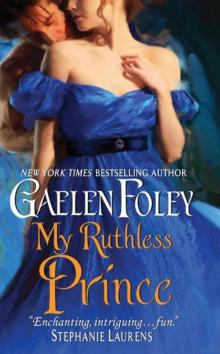 My Ruthless Prince
My Ruthless Prince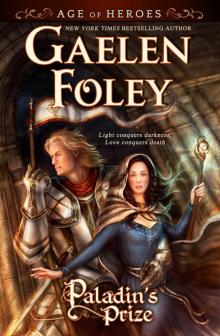 Paladin's Prize
Paladin's Prize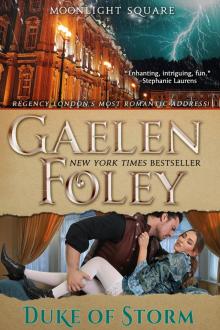 Duke of Storm
Duke of Storm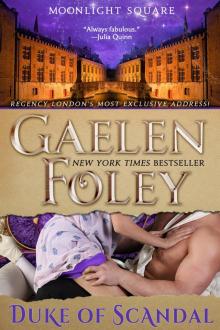 Duke of Scandal (Moonlight Square, Book 1)
Duke of Scandal (Moonlight Square, Book 1)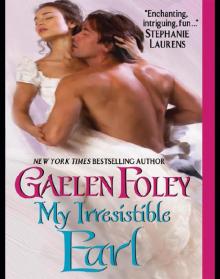 My Irresistible Earl
My Irresistible Earl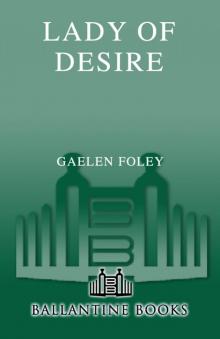 Lady of Desire
Lady of Desire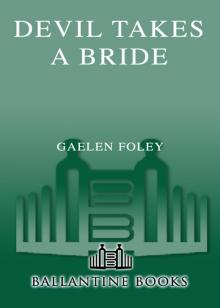 Devil Takes A Bride
Devil Takes A Bride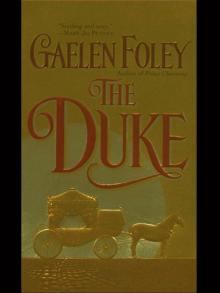 The Duke
The Duke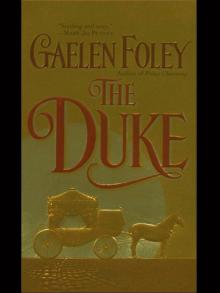 The Duke: The Knight Miscellany Series: Book 1
The Duke: The Knight Miscellany Series: Book 1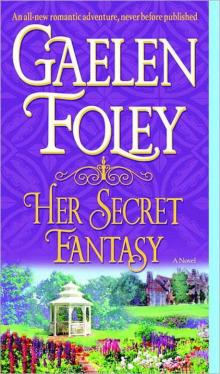 Her Secret Fantasy
Her Secret Fantasy Her Only Desire
Her Only Desire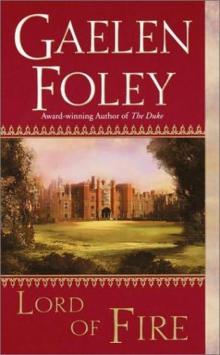 Lord of Fire
Lord of Fire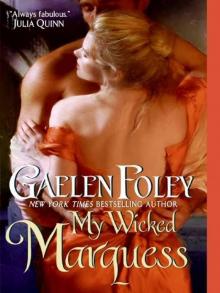 My Wicked Marquess
My Wicked Marquess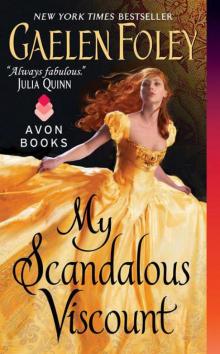 My Scandalous Viscount
My Scandalous Viscount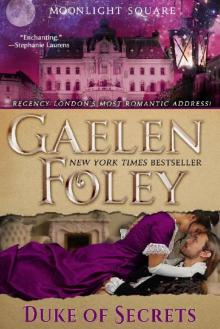 Duke of Secrets (Moonlight Square, Book 2)
Duke of Secrets (Moonlight Square, Book 2)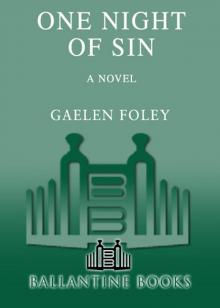 One Night of Sin
One Night of Sin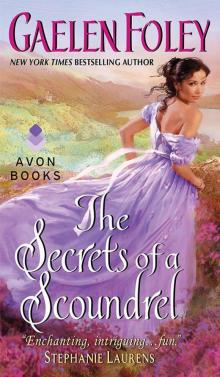 The Secrets of a Scoundrel
The Secrets of a Scoundrel Dream of Me (Harmony Falls, Book 1)
Dream of Me (Harmony Falls, Book 1)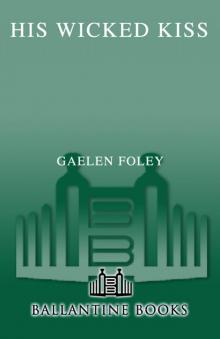 His Wicked Kiss
His Wicked Kiss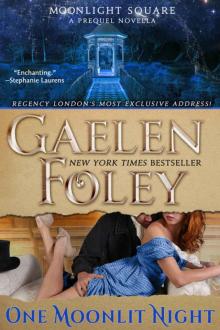 One Moonlit Night (Moonlight Square: A Prequel Novella)
One Moonlit Night (Moonlight Square: A Prequel Novella)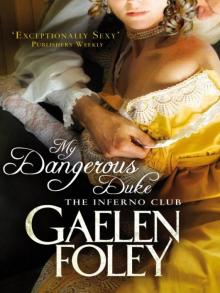 My Dangerous Duke
My Dangerous Duke